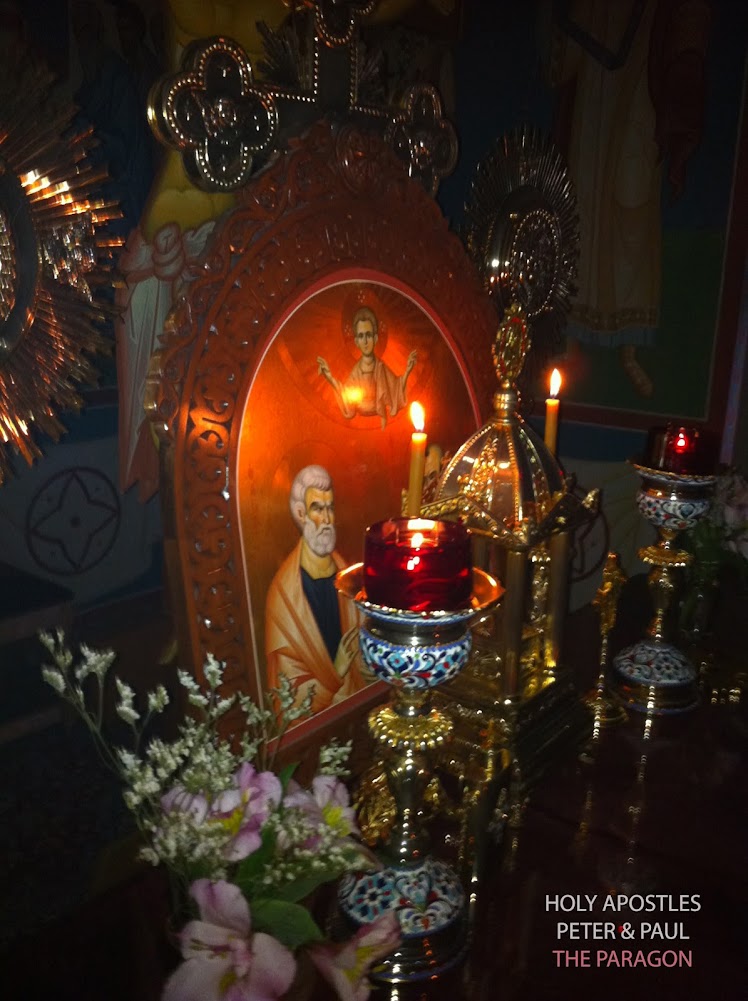These holy martyrs are celebrated on January 31. On that date, their lives and sufferings are chronicled. June 28 commemorates the translation of their relics from Canopus to Menouthis and the numerous miracles which occurred over their relics.
St. Cyril, Patriarch of Alexandria, prayed fervently to God to destroy the idolatrous impurity in the town of Menouthis where a pagan temple was located and where the power of the demons ruled. An angel of God appeared to the patriarch and told him that Menouthis would be cleansed of its impurity if he translated the relics of Saints Cyrus and John to that town. The patriarch did this immediately. He translated the relics of the martyrs to Menouthis and built a church there in honor of Saints Cyrus and John. Ammonius, the son of Julian the mayor of Alexandria, was healed of scorfula (a form of tuberculosis); a Theodore healed of blindness; Isidore of Menouthis was cured of a decaying disease of the liver; the wife of Theodore from poisoning, a Eugenia of dropsy as well as many other people were healed of various diseases and torments by the relics of these saints. This all occurred in the year 412 A.D.
Romans 16:1-16 KJV
16 I commend unto you Phebe our sister, which is a servant of the church which is at Cenchrea:
2 That ye receive her in the Lord, as becometh saints, and that ye assist her in whatsoever business she hath need of you: for she hath been a succourer of many, and of myself also.
3 Greet Priscilla and Aquila my helpers in Christ Jesus:
4 Who have for my life laid down their own necks: unto whom not only I give thanks, but also all the churches of the Gentiles.
5 Likewise greet the church that is in their house. Salute my well-beloved Epaenetus, who is the firstfruits of Achaia unto Christ.
6 Greet Mary, who bestowed much labour on us.
7 Salute Andronicus and Junia, my kinsmen, and my fellow-prisoners, who are of note among the apostles, who also were in Christ before me.
8 Greet Amplias my beloved in the Lord.
9 Salute Urbane, our helper in Christ, and Stachys my beloved.
10 Salute Apelles approved in Christ. Salute them which are of Aristobulus' household.
11 Salute Herodion my kinsman. Greet them that be of the household of Narcissus, which are in the Lord.
12 Salute Tryphena and Tryphosa, who labour in the Lord. Salute the beloved Persis, which laboured much in the Lord.
13 Salute Rufus chosen in the Lord, and his mother and mine.
14 Salute Asyncritus, Phlegon, Hermas, Patrobas, Hermes, and the brethren which are with them.
15 Salute Philologus, and Julia, Nereus, and his sister, and Olympas, and all the saints which are with them.
16 Salute one another with an holy kiss. The Churches of Christ salute you.
Saint Matthew 13:3-9 KJV
3 And he spake many things unto them in parables, saying, Behold, a sower went forth to sow;
4 And when he sowed, some seeds fell by the way side, and the fowls came and devoured them up:
5 Some fell upon stony places, where they had not much earth: and forthwith they sprung up, because they had no deepness of earth:
6 And when the sun was up, they were scorched; and because they had no root, they withered away.
7 And some fell among thorns; and the thorns sprung up, and choked them:
8 But other fell into good ground, and brought forth fruit, some an hundredfold, some sixtyfold, some thirtyfold.
9 Who hath ears to hear, let him hear.
Heaven and Hell
The Monk and the Soldier
From the Desert Fathers
(A repeat yes, but wonderful)
A Roman soldier came to an Egyptian hermit:
— Is there a hell? Is there a paradise? If yes, where are their gates? How can I enter the paradise?
[That man was a foot soldier. Soldiers are always simple-minded and clear-thinking. All he knew was life and death. He did not indulge in philosophy: all he wanted to know is where to go to avoid the hell and to get into the paradise.]
—Who are you? — the monk asked.
— I’m a Roman soldier, — the soldier replied. — It’s an honor to be a soldier in the Roman army. Only a perfect warrior deserves this position. Even the Emperor pays homage to us.
The monk laughed:
— Are you really a soldier? You look like a wretched beggar!
[These words offended the soldier to such an extent that he forgot why he had come to the hermit. In pride he drew out his sword in anger and was about to kill the monk.]
The monk laughed:
— That’s the Gate of Hell. You will open it with your sword by being angry and proud.
[It was an example that the soldier could comprehend. He was ashamed and put his sword back into his sheath.]
The monk continued:
— And that is where the Gate of Paradise is.
Why do we say 'home sweet home' and what makes home, home? Could it be a feeling that comes with 'taking our time' when we are at home?
And when we can finally 'take our time' saying prayers that's when I feel like we are at home with prayer.



.JPG)


No comments:
Post a Comment